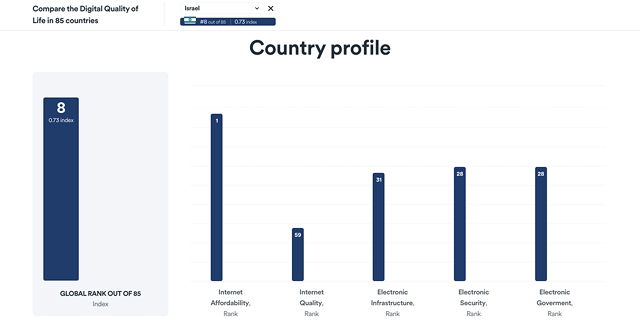
With cheap, but only adequate Internet access, Israel ranks 8th in digital quality of life
The 2020 global index by Surfshark ranks the quality of digital life in 85 countries
Israel was named in the study as the global leader in internet affordability. In total, the country’s mobile internet is the most affordable, and its broadband’s affordability was ranked as 4th.
The ‘winners’ in other categories included Singapore for internet quality and electronic government, the United Arab Emirates for electronic infrastructure, and the United Kingdom for electronic security.The study defines electronic security as “implementing effective cybersecurity policies and ensuring personal data protection”, and ranked Israel 28th. As expected, many European countries took the top spots due to protections put in place through the General Data Protection Regulation (GDPR).
Related Stories
2020 put unique pressures on digital life due to the coronavirus (Covid-19) pandemic. For example, 49 out of the 85 countries experienced drops in mobile connection and 44 in broadband speed due to more people working from home. While internet access is nearly ubiquitous in Israel, it is predominantly based on mobile and cable-based connections. Only 30% of Israeli households (800,000) have the infrastructure required to connect to fiber-optic internet, with just 6% (150,000) doing so to date.
Information for the study was gathered from open data sources provided by the United Nations, World Bank, International Telecommunications Union, U.S. Department of State, World Economic Forum, and others. Surfshark is a VPN provider than helps internet users hide their digital location by disguising IP addresses. It can protect users from hackers, malware, and identity theft - as well as open access to different shows on Netflix.View the Full Report here
